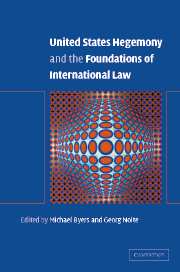Book contents
- Frontmatter
- Contents
- List of contributors
- Preface
- Introduction: the complexities of foundational change
- PART I International community
- 1 The international community, international law, and the United States: three in one, two against one, or one and the same?
- 2 The influence of the United States on the concept of the “International Community”
- 3 Comments on chapters 1 and 2
- PART II Sovereign equality
- PART III Use of force
- PART IV Customary international law
- PART V Law of treaties
- PART VI Compliance
- Conclusion
- Index
2 - The influence of the United States on the concept of the “International Community”
Published online by Cambridge University Press: 13 July 2009
- Frontmatter
- Contents
- List of contributors
- Preface
- Introduction: the complexities of foundational change
- PART I International community
- 1 The international community, international law, and the United States: three in one, two against one, or one and the same?
- 2 The influence of the United States on the concept of the “International Community”
- 3 Comments on chapters 1 and 2
- PART II Sovereign equality
- PART III Use of force
- PART IV Customary international law
- PART V Law of treaties
- PART VI Compliance
- Conclusion
- Index
Summary
But do the nations constitute a community? … The history of International Law is, largely, the history of the formation of this community, so far as it may be said to have been formed – the building up of common opinions upon common practices and the writings of commonly accepted commentators.
Woodrow Wilson, later president of the United StatesForeign policy in a Republican administration will most certainly be internationalist … But it will also proceed from the firm ground of the national interest, not from the interests of an illusory international community.
Condoleezza Rice, now US National Security AdvisorEvery nation in every region now has a decision to make. Either you are with us, or you are with the terrorists …
This is not, however, just America's fight. And what is at stake is not just America's freedom. This is the world's fight. This is civilization's fight. This is the fight of all who believe in progress and pluralism, tolerance and freedom.
George W. Bush, president of the United StatesIn the age of globalization, the “international community” appears omnipresent: it acts and intervenes, as in the case of Kosovo, it helps the victims of natural disasters, is called upon to redouble its efforts to prevent and suppress terrorist acts, as after the attacks against the United States on September 11,or seems helpless and inactive in spite of its best intentions, as in Congo or Sudan.
- Type
- Chapter
- Information
- Publisher: Cambridge University PressPrint publication year: 2003
- 19
- Cited by



